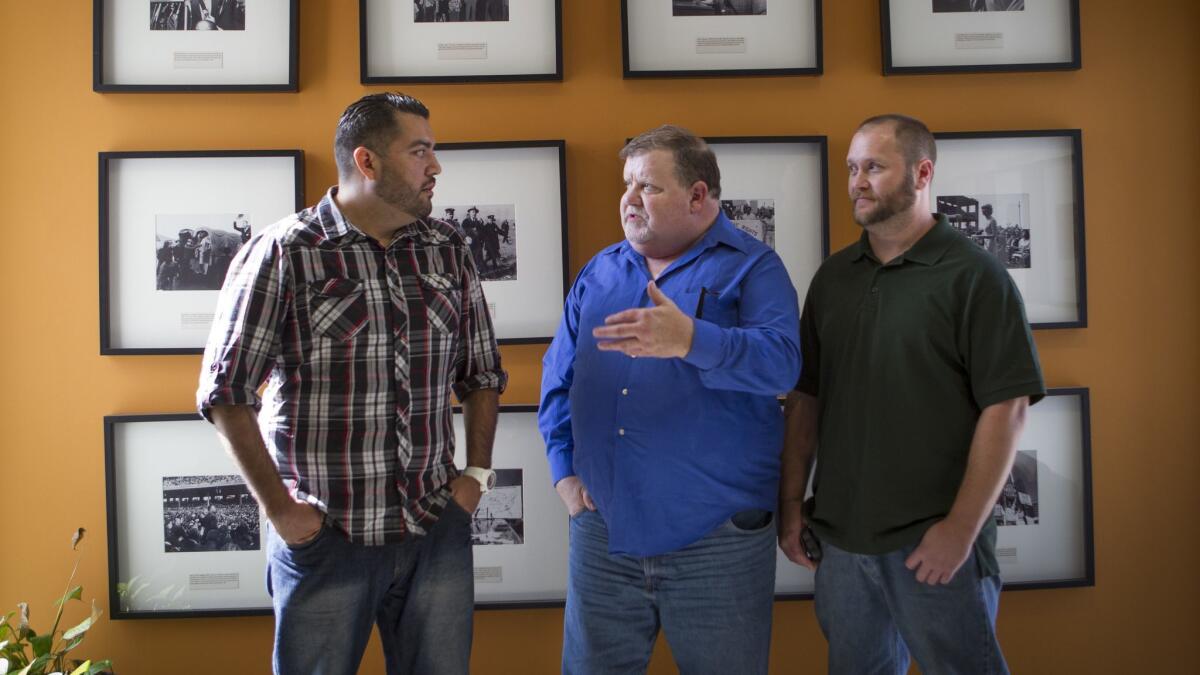San Bernardino County would change how it treats gay, bisexual and transgender inmates in proposed lawsuit settlement

- Share via
In 2013, Veronica Pratt, a transgender woman, was arrested and booked into the Alternative Lifestyle Tank at the West Valley Detention Center in Rancho Cucamonga.
There, along with other gay, bisexual and transgender inmates, Pratt was kept in her cell for about 23 hours a day.
She was not allowed to work, take vocational classes or participate in religious services, according to allegations described in a federal class-action lawsuit filed four years ago by the American Civil Liberties Union and the law firm of Kaye, McLane, Bednarski & Litt LLP.
“It was just depressing. It was demeaning,” Pratt, 33, of San Bernardino said Wednesday.
“It’s a struggle being incarcerated and then to have someone tell you ... ‘You can’t go to classes, you can’t try to better yourself’ because of your sexual orientation. It’s degrading.”
This week, attorneys involved in the case announced they had reached a proposed settlement agreement with the county that would compel the San Bernardino County Sheriff’s Department to change the way it treats gay, bisexual, transgender and intersex inmates.
In their complaint, inmates described numerous cases in which they were subjected to hateful speech from deputies who called them and the detention unit by slurs and derogatory terms.
Numerous inmates said they, like Pratt, were let out of their cells for only about one hour a day, were denied equal access to drug rehabilitation and educational programs, and were unable to participate in work programs that could potentially help reduce their sentences.
Dan McKibben, a former sheriff’s deputy from Indiana, was one of those inmates. In 2014, he was arrested on a parole violation and taken to the Alternative Lifestyle Tank after he told deputies he was gay when he was being booked.
“When you’re sworn, you’re sworn. And I took that oath,” McKibben said at a news conference when the lawsuit was filed. “These guys, every other minute, were violating that.”
McKibben, who became the lead plaintiff in the case, died in 2016.
The settlement agreement, which was filed in federal court in Riverside, would compel the county to offer more housing options for gay, bisexual, transgender and intersex inmates; lift restrictions on participation in work, educational, religious and community reentry programs; and establish a committee that will meet regularly with incarcerated gay, bisexual, transgender and intersex people to discuss their housing options.
Transgender and intersex inmates will also have the opportunity to be housed based on their gender identity.
The settlement also includes a nearly $1-million payment that will be divided among class members. And the Alternative Lifestyle Tank will be renamed the GBTI Unit — gay, bisexual, transgender and intersex.
Inmates will still have the option of being housed in that unit. But when they are, they will have equal access to classes, time out of their cells, rehabilitation courses and other programs that other inmates are able to take advantage of, said ACLU of Southern California staff attorney Brendan Hamme.
“Nobody should have to suffer discrimination while they are incarcerated,” Hamme said. “It’s detrimental to their emotional well-being and their prospects for rehabilitation.”
Jodi Miller, spokeswoman for the Sheriff’s Department, declined to comment because the settlement has not been approved by the judge.
A hearing in the case is scheduled in September.
For more Inland Empire news follow me @palomaesquivel
More to Read
Sign up for Essential California
The most important California stories and recommendations in your inbox every morning.
You may occasionally receive promotional content from the Los Angeles Times.











